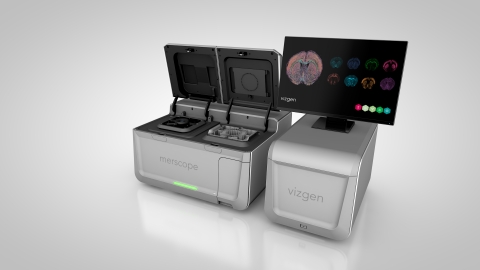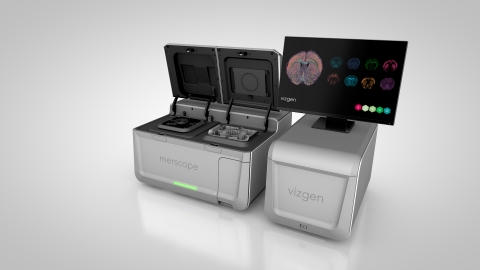CAMBRIDGE, Mass.--(BUSINESS WIRE)--Vizgen, the life sciences company visualizing biology to advance human health, today announced the highly anticipated MERSCOPE™ platform ahead of their presentation tomorrow at the Advances in Genome Biology and Technology (AGBT) 2021 General Meeting. Vizgen is unveiling the industry’s first solution that combines single-cell and spatial genomics analysis in one integrated system. MERSCOPE is a game-changing genomics tool for in situ analysis, providing a streamlined workflow from sample preparation through data visualization for broad applications in both fundamental biology and medicine.
“We are excited to bring MERSCOPE to market to help leading scientists and physicians advance their studies into the molecular basis of health and disease,” said Terry Lo, President & CEO, Vizgen. “The unprecedented insights MERSCOPE yields will enable transformative discoveries that lead to medical breakthroughs and novel treatments for some of the world’s most devastating diseases.”
MERSCOPE is based on the proven MERFISH technology developed in the laboratory of Dr. Xiaowei Zhuang, a Howard Hughes Medical Institute Investigator, and David B. Arnold, Jr. Professor of Science at Harvard University. Vizgen is offering the only commercially available solution for MERFISH technology, which features combinatorial labeling, sequential imaging, and error-robust barcoding, providing the highest detection efficiency available for spatially profiling gene expression across whole tissues and resolving individual transcripts with nanometer-scale resolution. Vizgen’s imaging-based approach enables hundreds of genes to be profiled within hundreds of thousands of cells in a single instrument run without the need or cost of sequencing. MERSCOPE is designed for flexibility on any sample or tissue type and includes validated or custom gene panels, reagents and consumables, fully automated analytical instrumentation, and data visualization software.
“Vizgen’s MERSCOPE is the first single-cell spatial genomics platform and will be transformative to advance our understanding of the retina,” said Rui Chen, PhD, Professor Molecular and Human Genetics, Baylor College of Medicine. “With high resolution and sensitivity, the technology enables us to map the structural organization, profile disease states, and study rare subpopulations, shedding new light on the mechanisms of retina disease.” Dr. Chen’s work is funded by NIH/NEI and the Chan Zuckerberg Initiative (CZI) as part of the Human Cell Atlas (HCA) Seed Network project, particularly focusing on generating a reference map for the human retina at the single cell resolution.
Nature Methods crowned spatially resolved transcriptomics the “Method of the Year 2020” and highlighted MERFISH in its Technology Feature and Comment. The technology was first published in Science in 2015 and has already amassed over a dozen peer-reviewed publications. Vizgen’s technology is employed by world-leading academic research institutions, including the Broad Institute of MIT and Harvard and The Rockefeller University.
“The kidney is a highly complex organ with an intricate spatial organization with many distinct cell types,” said Benjamin D. Humphreys, MD, PhD, Joseph Friedman Professor of Renal Diseases in Medicine and Chief, Division of Nephrology, Washington University School of Medicine in St. Louis. “Vizgen’s platform enables us to quantify transcripts very accurately for hundreds of genes with subcellular resolution, making it possible to profile many lowly expressed but functionally important genes, illuminating the distinct roles that different cell types play during kidney injury.” Dr. Humphreys is a distinguished global leader in kidney research, working to develop new therapeutic strategies to prevent kidney failure, a potentially fatal condition affecting 37 million Americans. He’s a recipient of the Gottschalk Award, American Society of Nephrology, and serves as Secretary Treasurer of the American Society of Clinical Investigation.
Vizgen’s technology is widely recognized by the research community as a premier technology for building molecular and cellular atlases, and is used as a tool for many of the Human Cell Atlas projects. MERSCOPE is also advancing oncology research, illuminating how the immune system responds to cancer at the molecular network level, providing new insight into the tumor microenvironment and tumor heterogeneity for informing development of novel therapeutics that prevent and treat cancer.
To learn more about the MERSCOPE solution, including a preview of the commercial product and its availability, tune in tomorrow at 2:30PM to watch Vizgen President and CEO, Terry Lo, present “Mapping the Future with Spatial Genomics” at the virtual AGBT General Meeting. To schedule a meeting with a Vizgen Scientist to discuss your research needs, go to: info.vizgen.com/agbt2021. Additional information on MERSCOPE is available at: https://www.vizgen.com/products.
About Vizgen
Vizgen is developing the next generation of spatially resolved genomic profiling tools that enable researchers to gain new insight into the biological systems that underlie human health and disease. The company's MERSCOPE platform enables massively multiplexed, genome-scale nucleic acid imaging with high accuracy and unrivaled detection efficiency at subcellular resolution. MERSCOPE provides transformative insight into a wide range of tissue-scale basic research and translational medicine in oncology, immunology, neuroscience, infectious disease, developmental biology, cell and gene therapy, and is an essential tool for accelerating drug discovery and development. For more information, go to www.vizgen.com and connect on social media @Twitter, @LinkedIn and Facebook.




